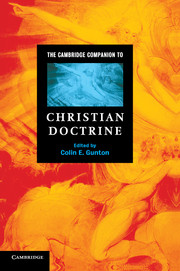Book contents
- Frontmatter
- Part one Christian doctrine in the late twentieth century
- 1 Historical and systematic theology
- 2 On doctrine and ethics
- 3 The basis and authority of doctrine
- 4 The scope of hermeneutics
- 5 Christ and the cultures: The Jewish people and Christian theology
- 6 Christ and the cultures: Christianity and the arts
- Part two The content of Christian doctrine
- 7 The triune God
- 8 The doctrine of creation
- 9 Human being, individual and social
- 10 Redemption and fall
- 11 The church and the sacraments
- 12 Eschatology
- 13 Jesus Christ
- 14 The Holy Spirit
- General index
- Index of biblical references
4 - The scope of hermeneutics
Published online by Cambridge University Press: 28 May 2006
- Frontmatter
- Part one Christian doctrine in the late twentieth century
- 1 Historical and systematic theology
- 2 On doctrine and ethics
- 3 The basis and authority of doctrine
- 4 The scope of hermeneutics
- 5 Christ and the cultures: The Jewish people and Christian theology
- 6 Christ and the cultures: Christianity and the arts
- Part two The content of Christian doctrine
- 7 The triune God
- 8 The doctrine of creation
- 9 Human being, individual and social
- 10 Redemption and fall
- 11 The church and the sacraments
- 12 Eschatology
- 13 Jesus Christ
- 14 The Holy Spirit
- General index
- Index of biblical references
Summary
Whatever its other responsibilities may be; Christian theology cannot evade the task of biblical interpretation. It is in the biblical texts that the irreplaceable primary testimony to the God acknowledged in Christian faith is to be found. According to Christian faith, this God cannot be directly deduced from general features of the world and our human experience of it, and the effect of this is to emphasise our dependence on a highly particular stream of religious and cultural tradition: the history of Israel, which for Christians reaches its climax in the events that brought the Christian church into being, and which at its deepest level is not merely a component of the general history of the world but the privileged 'place' in which God is uniquely disclosed and acknowledged. There is no access to this 'place' except by way of the biblical texts, and biblical interpretation is therefore theology's primary task - the object of interpretation being the biblical texts in their integral relation to that to which they bear witness.
- Type
- Chapter
- Information
- The Cambridge Companion to Christian Doctrine , pp. 65 - 80Publisher: Cambridge University PressPrint publication year: 1997
- 1
- Cited by

